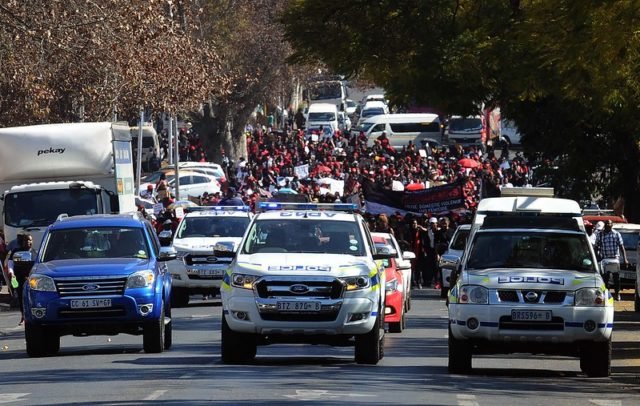Public sectors union have announced their plan to strike following a breakdown in negotiations with the government over wage increases.
The unions, which form part of the South African Federation of Trade Unions (Saftu), picketed outside the Public Service Co-ordinating Bargaining Council (PSCBC) on Tuesday (20 September), protesting the wage offer of a 3% increase.
Workers are demanding an 8% hike.
“After the last sitting of the PSCBC, the employer proposed a 3% pay increase which we presented to our members. Workers made it very clear that they reject the offer,” the unions said.
Public servants have gone three years with little to no increase in salaries after National Treasury committed to cutting the country’s public wage bill. The government reneged on its agreed wage increase for 2020 when it froze salaries in response to the Covid-19 pandemic.
Government workers received no increase in 2020 and a small 1.5% bump in 2021. The government initially offered 1.5% again in 2022, before unions negotiated it up to 3% in the latest round of talks.
However, this has been rejected by members, with the next step being to strike.
“We have received a certificate of non-resolution, which means that we will now embark on a process of balloting our members and writing down picketing rules in the preparation for a strike,” the unions said. “There will be a major strike that will occur within the public service.”
The wage offer of 3% was rejected on the basis that salaries for public sector workers had not increased in three years. This lack of increase has had a negative impact on workers’ lives, the unions said, because costs are rising, but the salaries have stayed the same.
The unions said that the public sector has a reputation of being highly paid, but this was not reflective of the low-end workers who were demanding increases. The government’s wage offer only applies to levels 1 through 12 in the public sector salary scales – which excludes top-earners like senior managers.
Workers represented by the unions include police officers, security workers, educators and other public servants in various government departments.
The public sector is not the only industry that is plotting strike action. The Police and Prisons Civil Rights Union (Popcru) is demanding a 10% increase in wages and also embarked on a protest at the Union Buildings on Tuesday.
The National Union of Metalworkers of SA (Numsa), meanwhile, announced that it expects a strike certificate to be issued this week, which will have a huge impact on the automotive sector if it proceeds.
Numsa is demanding a 12% wage increase from employers in the motor sector who have offered increases of between 3% and 4%.
ALSO READ: SA inflation dips to 7.6% in August, the lowest monthly change since January.
“The date of the strike has not been confirmed. However, in the meantime, members are said to be mobilizing all over the country for a total shutdown of the automotive sector,” the Bureau for Economic Research said.
Strike action over wages is a key pressure point for the economy because rising wage demand drives interest rates higher.
South Africa narrowly avoided a major strike by the private security industry last week after employers in the sector came to an agreement with the South African Transport and Allied Workers Union (Satawu) over wages.
Source: Business Tech

